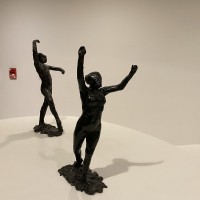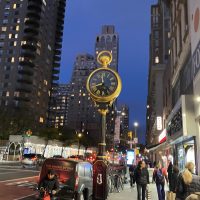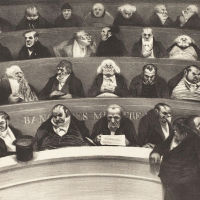
Today is Bishwa Matri Bhasha Dibosh, International Mother Language Day. For Bengalis it’s especially significant, because ours is the language that started it all. On this day, 72 years ago, our fellow Bengalis in Bangladesh (then “East Pakistan”) bravely defended this beautiful language of ours against the imperial impulses of the more dominant segment of their then-national “community” – or what was supposed to be one.

I was thinking about what it means to have a “mother tongue” in our era, when so many of us are bilingual or multilingual. Although I grew up bilingual, my very first words were certainly in Bangla, the language of my parents. In fact, I’m convinced that buried in the deepest part of my brain, the very foundation of my mind and self, is probably a structure built in Bangla. I am reasonably proficient in Bangla. I can speak, read, and write in it competently and natively. But in many ways, my primary language is English. I tend to think in English, especially when the thought is a complex one. English is as much my “first” language as Bangla since I grew up speaking both. As a first-generation American, this is normal, no matter what your ancestral background is. And, for good or ill, it is also pretty common, even in India, for Bengalis—and all Indians—to communicate in English as organically as they do in their “own” languages, the ones their parents grew up speaking.
Is this a problem? I don’t subscribe to the proprietary brand of cultural sensibility, one that assumes history is inherited piecemeal by genetic happenstance and is exceedingly touchy about “appropriation” (as if the gatekeepers have kept track of millennia of their ancestors’ migration patterns and know exactly where their culture stops and another’s begins). That said, there is also something to be said for an identity that is at least in part informed by one’s connection to a place and a history and, yes, to some degree the bonds of family and ancestry. I saw an interesting piece of public art last summer that got me thinking about this topic. The sculpture “Ancestor” by Indian-American artist Bharti Kher was displayed just south of Central Park in Manhattan in the summer and fall of 2023. To me, it suggests a longing for cultural origin and roots, searching for it in iconography reminiscent of the myths and customs of one’s forebears, the type of thing I might look for in a Bengali song or story.
Language is a tool used to communicate—and to evoke—thoughts, ideas, facts, and emotions. It’s also a vehicle for cultural transmission. But in an increasingly multicultural, cross-cultural, and mobile world, what are the contours of “culture” and its transmission? In some sense there has NEVER been a time when those contours were definite. If that were the case, we would all still be sitting in our little ancestral villages or hunter-gatherer haunts. It is the cross-pollination of customs and ideas that brings about cultural evolution and vast civilizations, such as the current worldwide civilization. And that’s a beautiful thing.
Yet, sometimes there are great losses in the sidelines of the great hurtling tsunami of the human civilizational procession. Sometimes, when a strand of culture—like the English language—becomes a juggernaut (there you go, an “English” word borrowed wholesale from Hindustani)—it can lead to other strands of culture falling into disuse and decay. You might think, well, what’s wrong with that? This is the way of history. Heck, it’s the way of nature and evolution. When a mutation (whether a biological one or a cultural one) happens to survive and replicate, that fact of its survival and replication, no matter how random or accidental in origin, leads to further advantage which keeps snowballing, possibly until it completely dominates and decimates everything in its way… and eventually is overtaken by a different mutation that happens to have some survival advantage better suited to the new circumstances.
Those losses aren’t trivial. Think about it. A sudden disease outbreak wipes out a large portion of an animal species. The surviving population obviously had a genetic advantage in resisting that disease. But the lack of that resistance is not the only thing that died with the population that was wiped out. What about all the other genes and all their lost potential (some of which may not exist in the surviving population)? What about those traits and those genes? They’re gone forever. Sorry. This is life. It has been this way for billions of years.
Lazy thinking sometimes leads people to assume that “survival of the fittest” means that which survives does so because it is “superior” to that which doesn’t. But that’s inaccurate. That which has survived has done so because it happens to have had survival advantages in the particular circumstances that it happens to have encountered. Countless organisms have perished in cataclysms due to specific inabilities to deal with those specific problems but would’ve done well under other circumstances. Maybe I can survive a desert better than you, but you might have what it takes to survive in a flood that would wipe me out. It’s the luck of the draw. Nature’s crapshoot. (This is changing now, in the Anthropocene age, but that’s a different discussion).
Similarly, in the context of cultural change, sometimes we lose the richness of a language or a set of customs, just because another culture’s language and customs have become dominant for reasons having nothing to do with the utility or beauty of the language or customs but due to some other advantage. For example, superior skill at conquest and empire building and administrative efficiency can lead to a culture’s dominance, which can lead to ALL aspects of that culture becoming dominant, even those aspects that are not “superior” by most metrics.
I’ve sometimes heard people claim, rather blithely, that “as unfortunate as British imperialism was, it has conferred some benefits to the people it colonized, such as the English language.” It’s mindboggling that any intelligent person can think this way. The “English language” (as much as I love it) is but one among a multitude of sophisticated human languages. The only reason people feel that they “need” English is that it is the de facto dominant and common global language, as a matter of history. There is nothing inherent in this language that makes it somehow uniquely beneficial —certainly not for any of the speakers of the many Indian languages of ancient pedigree. (After all, Kalidas lived a thousand years before Shakespeare. Just saying).
The good news is that cultural evolution is different from physical/natural evolution in important ways. Natural evolution happens by chance entirely, with humans and other organisms being acted upon and having no conscious choice. By contrast, culture is a human invention; humans are the active agents generating it as much as they are products of it and as much as they are acted upon and shaped by it. Unexpected, serendipitous, sometimes bewildering things come out of the process, but the process comes out of the conscious and creative actions of humans.
So, we are not doomed to lose all aspects of a culture that has suffered some historical calamity and dealt with its fallout, as the language movement in Bangladesh has shown.
Categories: Culture, History, Thought Oven, Zoom











